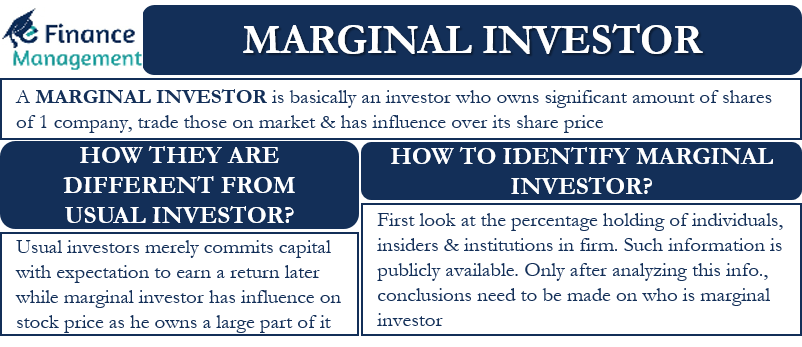A marginal investor is basically an investor who owns a significant amount of shares of one company and has an influence over its share price. Moreover, a point to note is that such an investor not just holds the shares but also trades those on the market. This way, such an investor actually helps in setting the stock price.
So, in short, he has to satisfy two criteria. First that he should hold a substantial/significant quantum of shares in the firm. And secondly, he should be actively trading in those shares.
Since such investors help in setting the price, their assessment of risk should guide other investors in understanding the risk.
It may get difficult to identify a marginal investor in a company. This is because such investors may vary depending on the number of investors in the company. But, usually, it is the person with the highest number of shares. An institutional investor can also be a marginal investor.
There have also been cases where marginal investors are the insiders. These insiders own a significant stake in the company and are also part of the management.
Also Read: Shareholders Vs Stakeholders
How They are Different From Usual Investor?
Talking about how these investors are different from any usual investor, the latter merely commits capital with an expectation to earn a return later on. On the other hand, a marginal investor is a representative investor who influences the stock price as they own a large part of it. Also, these investors trade those shares on the market. A point to note is that if an investor owns a large number of shares in a company, but does not trade it, then they will not be able to influence the share price. And thus, such an investor would not be a marginal investor.

How to Identify Marginal Investor?
To identify a marginal investor in a company, we first need to look at the shareholding structure or percentage holdings of individuals, insiders, and institutions in the firm. Such information is publicly available. Only after analyzing this information conclusions can be drawn as to who is the marginal investor:
- If a company has smaller institutional holdings in comparison to individual investors, then the marginal investor has to be an individual with a significant stake. In such a case, to assess the project risk, we will need to take into account how diversified the portfolio of that individual investor is. If their portfolio is not diversified, then the cost of equity must include a premium for all risks.
- In case a company has smaller institutional holdings and smaller insider holdings. And it has a large number of individual investors who own small equity holdings. In such a case, an individual investor is one. Utility companies that pay high dividends are a good example of such a type of holdings.
- Now suppose a firm has small insider holdings but significant institutional holdings. In such a case, a diversified institutional investor can be the marginal investor in the firm.
- The task of identifying marginal investors gets tough if a firm has significant institutional holdings as well as insider holdings. Insiders usually mean the founder or the promoters of the firm. Though it may include employees also, but they may not have a significant stake. Again these insiders are not likely to trade in their shares on a regular basis (except for employees with insignificant stake). Therefore, the only external party with significant shareholding remains is the Institutional Investor. Hence, the institutional investor will be the marginal investor in the firm.
Frequently Asked Questions (FAQs)
The investor of the company who satisfies the following conditions qualify as a marginal investor:
– who owns a significant amount of shares of one company
– trades such shares on the market
A usual investor merely commits capital with an expectation to earn a return later on. On the other hand, a marginal investor is a representative investor who has an influence on the stock price.

